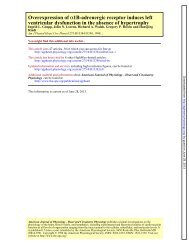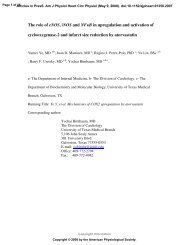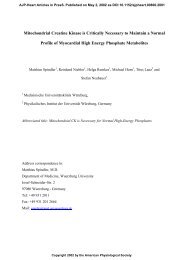1 Mariannick Marcil, Karine Bourduas, Alexis Ascah, Yan Burelle ...
1 Mariannick Marcil, Karine Bourduas, Alexis Ascah, Yan Burelle ...
1 Mariannick Marcil, Karine Bourduas, Alexis Ascah, Yan Burelle ...
Create successful ePaper yourself
Turn your PDF publications into a flip-book with our unique Google optimized e-Paper software.
DISCUSSION<br />
Results from the present study provide evidence that in heart mitochondria, the sensitivity<br />
to Ca 2+ -induced PTP opening is influenced by the type of respiratory substrate oxidized, with<br />
complex I donors acting as sensitizers compared to complex II substrates. In addition, the<br />
present results indicate that regular exercise training can decrease the sensitivity to Ca 2+ -<br />
induced PTP opening when mitochondria are energized with complex II substrates. This effect of<br />
training was observed in the absence of changes in the physiological modulators of PTP<br />
opening investigated.<br />
Substrate specific regulation of the PTP:<br />
Fontaine et al. (22) have shown that in skeletal muscle mitochondria CRC is 3-4 fold<br />
lower in mitochondria energized with glutamate-malate compared to succinate. This marked<br />
difference in CRC was shown to be due to the fact that the factors contributing to PTP opening<br />
are different in the two experimental conditions. Indeed, in presence of complex I substrates the<br />
electron flow through this complex, independent of other regulators (i.e. redox state of PN’s, ,<br />
pH, ROS production), appeared to be the main factor regulating PTP opening by acting as a<br />
potent sensitizer (6, 22, 40). In contrast, when complex I was bypassed using succinate the<br />
mechanism was largely inactive and the contribution of other regulators to PTP opening were<br />
unmasked. Results from the present study are in line with these data. Indeed, in both<br />
experimental groups a substantially lower CRC was observed in presence of glutamate-malate<br />
compared to succinate. Our data thus indicate that similar to what is observed in skeletal muscle<br />
the electron flow through complex I sensitize heart mitochondria to PTP opening.<br />
Training-induced alteration in Ca 2+ handling:<br />
To our knowledge, the impact of exercise training on Ca 2+ handling by heart mitochondria<br />
has only been investigated in two studies (50, 56) and the effect on the PTP was not directly<br />
14






